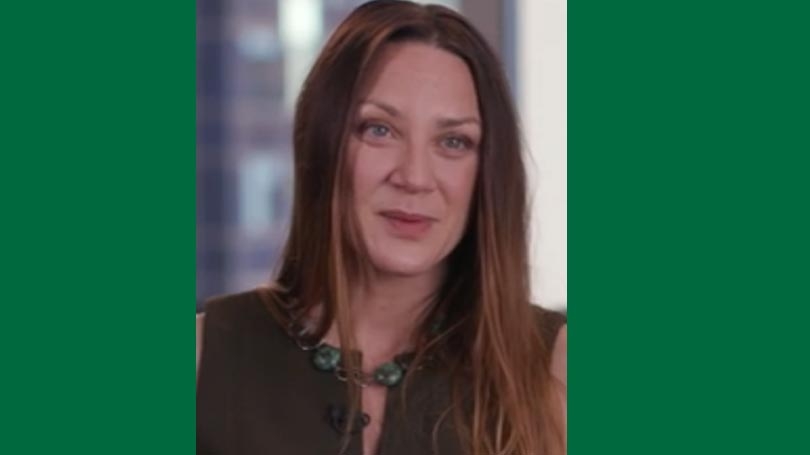Being part of a highly networked community is a frequently cited reason for the appeal of a Dartmouth education. The close-knit collegial environment on campus extends beyond commencement into a strong and connected alumni community. Such connections foster deep learning and opportunities that other schools strive to cultivate. GRAD alumna Kimberly Rose Clark (’04) taps into our local and global Dartmouth community and nimbly brings her research industry’s network and expertise to the Consumer Neuroscience course she teaches in the Department of Psychological and Brain Sciences.
A GRAD alumna, with a PhD in Psychological & Brain Science, Clark co-founded the research consultancy Merchant Mechanics with her partner, and fellow GRAD alum, Matthew Tullman. Merchant Mechanics was founded over 18 years ago on a strong desire to bridge academic theories, garnered from behavioral economics and neuroscience, into real-world client applications not possible with traditional market assessments. In addition to her role as Chief Research Officer at the West Lebanon, NH-based firm, Clark serves as the United States co-chair of the Neuromarketing Science & Business Association (NMSBA), along with Drs. Michael Smith, Vice President Consumer Neuroscience Solutions at Nielsen Consumer Neuroscience, and Moran Cerf, Professor of the Kellogg School of Management and the Neuroscience Program at Northwestern University.
The Consumer Neuroscience course, PSYC54, takes students on a deep dive into the neuroscience of consumer decision-making; using cutting edge psychological and neuroscientific tools to collect and integrate data streams from brain, biometric, behavioral, and attitudinal data, students develop a rich understanding of their utility and how they can be harnessed to address the needs of the non-profit partners. “By exposing students to the same methodologies that we employ for clients at Merchant Mechanics, we create a unique opportunity to broaden their understanding of bleeding-edge research capabilities,” says Clark. “I want to give my students as many professional tools as possible in their time with me. After graduation, I don’t just hope students will remember my class; I want them to actively use what they’ve learned during class for years to come,” she adds.
This, unusual for an undergraduate course, includes submitting for approval from the Institutional Review Board for Protection of Human Subjects in Research (IRB), a process that not only equips them to conduct the research, but also frames their identity as “pracademics”, a phrase Clark has made popular to describe someone who is both an academic and an active practitioner in their subject area.
In addition to the research and scientific dimensions, Clark opened up her professional network to the students both by inviting industry leading colleagues to speak to the class and by creating the growing Consumer Neuroscience group on LinkedIn. In that online group setting, students were charged with posting an original thought piece centered on an ethical evaluation of real-time commercial and government applications of the brain and body measures used in class. They then received virtual feedback from a global network of professionals interested in the bourgeoning field, which span from fellow students to academics to practitioners.
Additionally, the class welcomed both in-person and virtual visits from field-leading practitioners and academics from Facebook, IPSOS, Nielsen, INSEAD School of Business and The Harvard Business School, among others. A special interactive demonstration was conducted by Geoff Gill. CEO of Irish-headquartered biometric solutions provider Shimmer. Gill visited class to showcase an as-yet unannounced product which measures simultaneous crowd-based responses to marketing stimuli; a research solution currently considered the next advancement in the field.
The course also includes a Social Impact Practicum (SIP) coordinated with the Dartmouth Center for Social Impact. “We collaborate with community partners and process a Needs Assessment evaluation, yielding around 175 projects this past year for close to 50 organizations,” explains Associate Director Ashely Doolittle. “Then we match those needs to faculty who are developing courses that align with the mission of the organizations we work with.” The courses must be completed over one term, and are deeply informed by the experiential learning model, one which encourages practical application of learning to real-world problems. “When several of our partners requested marketing redesign, we initially thought we’d find alignment in Tuck, but Professor Clark’s course turned out to be the perfect match,” Doolittle says.
“Connecting nonprofit logo redesign with SIP outcomes was an ideal fit for the Consumer Neuroscience course,” agrees Clark. “It provided a unique way to connect theory and practice,” she adds. In the Fall17 course, students worked with local graphic designers from Chameleon Studios & Nomad Communications to create advertising graphics which students then tested as part of lab work in class. Using a standard advertising A|B test and applying the tools and learnings from coursework, students were able to inform the advertising initiatives and objectively select the most effective versions of the creative pieces.
Seven community partners, including the Vermont Institute of Natural Sciences , Dartmouth Hitchcock Medical Center’s Honduran-focused PESCA Team, The Agency on Aging’s Vermont-centered Senior Solutions, Four Winds Nature Conservancy, The Crossroads Academy and National Center for Special Education in Charter Schools (NCSECS) were among the stakeholder organizations directly benefitting from the coursework. Student’s final experientially-oriented capstone research projects were presented to community audiences, which counted Dartmouth’s President Phil Hanlon among their numbers.
Working with Clark on meaningful research questions in a community of practitioners that Clark invites to the class is an exhilarating opportunity for undergraduates. Students who took her course in the fall term described it as “eye-opening”, “impactful”, and “innovative.” They spoke of the transformative effect it had on their ability to think outside the box, and of Clark’s enthusiasm and passion. “Dr. Clark walks in to class everyday with an enthusiasm to share her passion… It has been a pleasure learning from Dr. Clark,” says one student, Armin Tavakkoli, class of 2020.
Through professional networking, practical applicaiton, real-world problem solving, and academic rigor the Clark's course encapsulates all that is good about a Dartmouth education, from undergrad to graduate.
